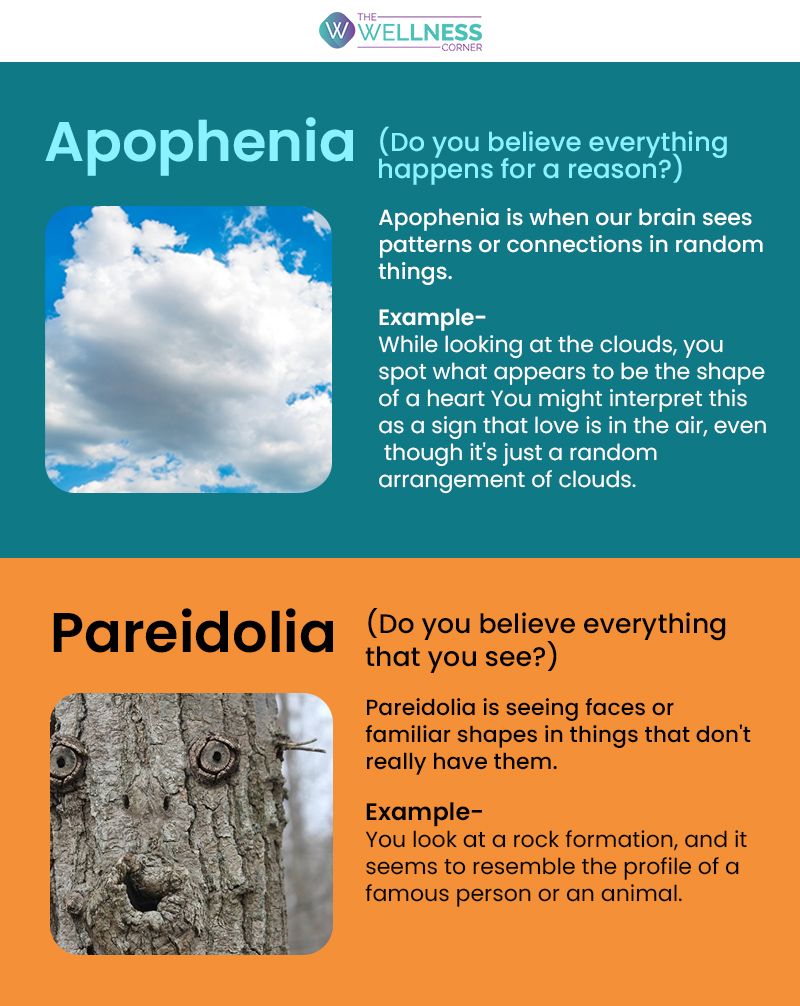Is It Ok To Believe That Everything Happens For A Reason?
29 months ago
3 minute read.

The human mind is a fascinating and complex entity, capable of perceiving patterns, connections, and meanings in the world around us. We often seek explanations for events and occurrences, looking for reasons behind everything that happens.
Apophenia is a psychological concept that refers to our tendency to perceive meaningful patterns or connections in random or unrelated data. It is essentially the human mind's inclination to find significance and order in the chaos of the world. This phenomenon can manifest in various ways, such as seeing shapes in clouds, finding hidden messages in songs, or attributing personal meaning to coincidences.
Apophenia is a natural cognitive process that helps us make sense of our surroundings and make predictions based on past experiences. It can be seen as a form of pattern recognition gone slightly astray, as our brains sometimes overgeneralize or find patterns where none truly exist. While this inclination can be beneficial in certain situations, such as problem-solving or creativity, it can also lead to cognitive biases and the misinterpretation of information.

Is apophenia a mental disorder?
Apophenia itself is not a mental disorder. It is a common human tendency to search for connections and patterns in the world, which helps us create order and make sense of things.
However, extreme apophenia can be a symptom of certain mental illnesses, like schizophrenia. Schizophrenia is a mental disorder where people have trouble distinguishing what is real and what is not. They may experience delusions, hallucinations, and disorganized thinking.
While occasional moments of apophenia are normal, if someone consistently has extreme apophenia along with other symptoms like hallucinations or disorganized thinking, it could be a sign of a mental health issue like schizophrenia.
Also check: Is dealing with a change terrifying for you? Overcome that

Example of apophenia
Apophenia occurs when you make connections that don't exist, see patterns where none exist, or give meaning without clear proof.
Here are three examples of apophenia:
- Seeing shapes in clouds: Perceiving familiar shapes or objects in random cloud formations.
- Finding hidden messages in songs: Interpreting unintended messages or meanings in music, often through backward lyrics or specific sounds.
- Interpreting coincidences as signs: Assigning personal significance to a series of coincidences, considering them as meaningful signs or guiding omens.
Causes of apophenia
It is a cognitive bias that can lead individuals to see connections, correlations, or hidden messages where none exist. While the exact causes of apophenia are not fully understood, several factors contribute to its occurrence:
- Human pattern-seeking.
- Cognitive biases.
- Need for control and certainty.
- Emotional influence.
- Randomness and coincidence.
- Cognitive processing abnormalities.
Also read: A ray of hope when antidepressants have failed!
What's the difference between apophenia and pareidolia?
Apophenia is a more general term that refers to the tendency to perceive patterns or connections in random or unrelated data. It encompasses the broader concept of finding meaning or significance in seemingly random information. On the other hand, pareidolia is a specific type of apophenia that specifically involves perceiving recognizable images or patterns, often in the form of faces, in ambiguous stimuli.
While both apophenia and pareidolia are related to our brain's inclination to seek patterns and derive meaning from our surroundings, pareidolia specifically focuses on visual patterns, especially faces, whereas apophenia can apply to a wider range of perceived connections or meanings.
How to cope with apophenia?
Coping with apophenia involves recognizing and managing these tendencies to avoid jumping to unfounded conclusions or attributing significance to chance occurrences. Some strategies that may help:
- Be aware of your tendency to see patterns where there may not be any.
- Think critically and question information before jumping to conclusions.
- Be skeptical of extraordinary claims and demand strong evidence.
- Use reliable data analysis methods to determine the validity of patterns.
- Find a balance between skepticism and openness to new ideas.
- Practice mindfulness to recognize when your mind is creating false connections.
- Seek feedback from others to challenge your own biases.
- Expose yourself to diverse information sources to broaden your understanding.
- Consult experts for specialized topics to get informed perspectives.
- Manage your emotions and evaluate situations rationally.
Also check: It's time that you accept you can't do everything!
Conclusion
Apophenia is a fascinating psychological phenomenon that sheds light on our innate tendency to find meaning and causality in the world around us. While it is human nature to search for reasons behind events, it is crucial to recognize the role of randomness and chance.
By embracing critical thinking and rationality, we can navigate the fine line between acknowledging patterns where they genuinely exist and avoiding the pitfalls of apophenic thinking. Remember, not everything happens for a reason, but our ability to discern meaningful connections can profoundly shape our perceptions and actions.
Leave a Comment
Related Articles
Health Checks @ Home
Service
Explore
© 2026 Truworth Health Technologies Pvt. Ltd.




